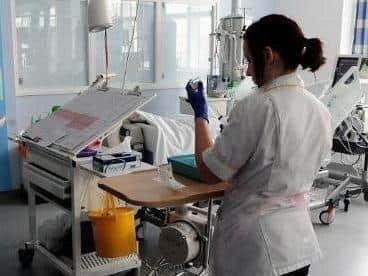Paying hospital bills and higher taxes trump desire for Irish unity: Survey
and live on Freeview channel 276
And a quarter of Sinn Fein voters and almost 30% of SDLP supporters would say no to a united Ireland if it resulted in them having to pay higher taxes and hospital bills, the poll found.
One of the authors of the extensive public attitude survey which was conducted between the middle and end of last month said the findings demonstrated that while unionism faces a crisis in falling political engagement, support for Northern Ireland to stay in the Union remains solid.
Advertisement
Hide AdAdvertisement
Hide AdThe key results of the poll for the Univeristy of Liverpool’s Institute of Irish Studies commissioned by the Irish News are:


• Support for Irish unity in 10 to 15 years time increases from 30% now to 33% in the opinion poll;
• Only a quarter of people overall in the survey said they would vote for a united Ireland if it meant higher taxes and paying for healthcare;
• A quarter of Sinn Fein voters and almost 30% of SDLP supporters agreed that they would not vote for Irish unity if taxes were higher and healthcare had to be paid for;
Advertisement
Hide AdAdvertisement
Hide Ad• Two-thirds of nationalists agreed with the proposal put forward in the poll that “if devolved politics worked better people would focus less on the constitutional question”;
• Eighty per cent of those surveyed agreed that re-elected MLAs should not be paid if the Assembly does not return after May 5;
• A majority of respondents also agreed with the proposition in the poll that ‘Executive parties should jointly seek mitigations and easements from the EU regarding the protocol’.
Dr Peter Shirlow of the Institute of Irish Studies suggested that the finding that a quarter of Sinn Fein and SDLP voters would not vote for a united Ireland if it entailed higher taxation and no NHS-style free health service explains why support for Irish unity hovers around 30%.
Advertisement
Hide AdAdvertisement
Hide AdDr Shirlow said: “In effect political unionism is presently sitting in an electoral but not a constitutional crisis.”
The opinion poll found that Sinn Fein are currently the leading party with 27% support while the DUP lag behind with 20.2%.
In the last Assembly election in 2017 the DUP received 28.1% of the votes cast, just over a percentage point ahead of Sinn Fein.
Dr Shirlow added: “Things can change rapidly and it is important for the unionist parties to remember that an evolving, inclusive and progressive Northern Ireland has to be achieved for support remaining in the UK across all communities. That is critical to post-election politics. If they fail to deliver parity of esteem the slow drift will probably be to unity.”
Advertisement
Hide AdAdvertisement
Hide AdUlster Unionist Party leader Doug Beattie said the poll findings regarding the constitutional question underlined the importance of projecting a “confident, positive and inclusive unionism”.
He said it was interesting that the survey found that support for Irish unity in the 10 to 15 years time frame is 33%, which he added was “hardly a ringing endorsement” for a united Ireland.
The UUP leader continued: “The results are even more interesting once the question is asked about the health service and whether people would be happy to pay for treatment as is the case in the Republic, with significant numbers of Sinn Fein and SDLP voters saying they would vote no.”
Mr Beattie said the use of fear as a political tool within unionism should be rejected.
Advertisement
Hide AdAdvertisement
Hide Ad“The reality is that the Union of over 64 million people delivers for all the people of Northern Ireland.
“Unionism must promote the benefits of the Union to those who do not share our vision. We must reach out and demonstrate that we can build a society here in which everyone has a stake and a sense of belonging, and which is capable of creating a prosperous future,” the UUP leader added.
The attitude survey poll has been delivered by the Institute of Irish Studies at the University of Liverpool in association with the Irish News.
It was carried out among 1,000 respondents by the Social Market Research group with a margin of error of 3.1% between March 11 and March 26.